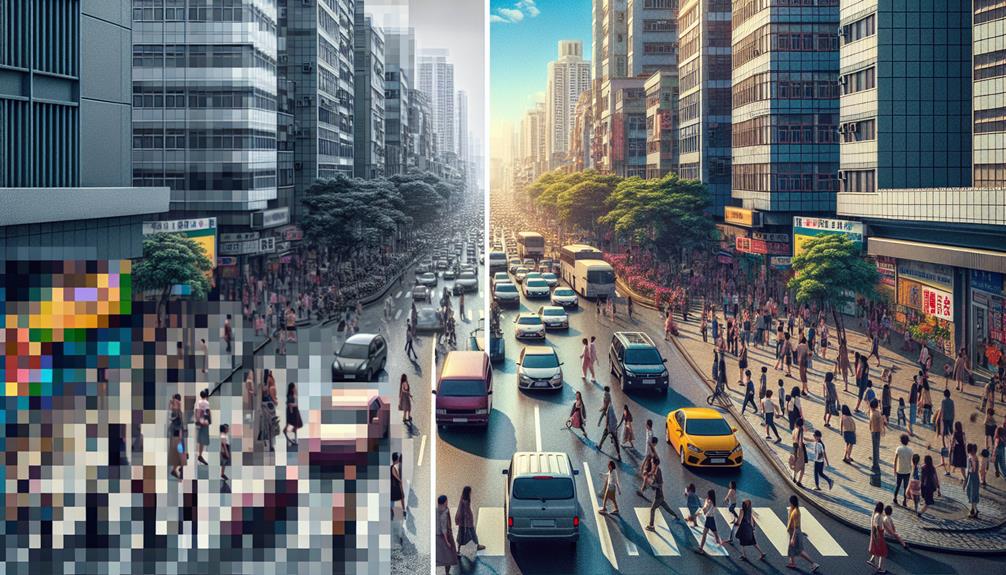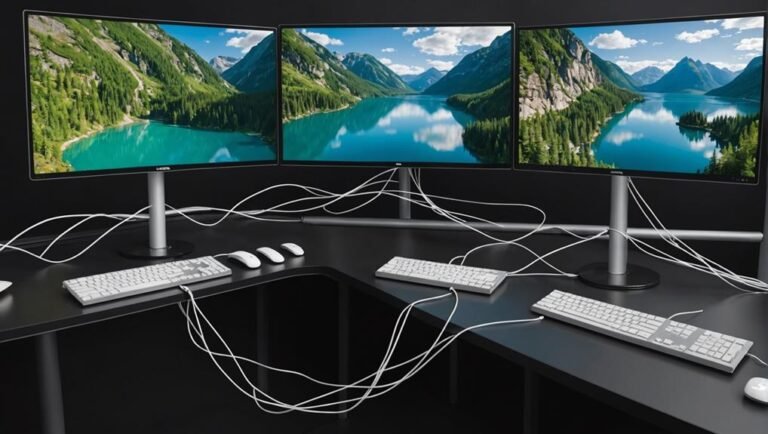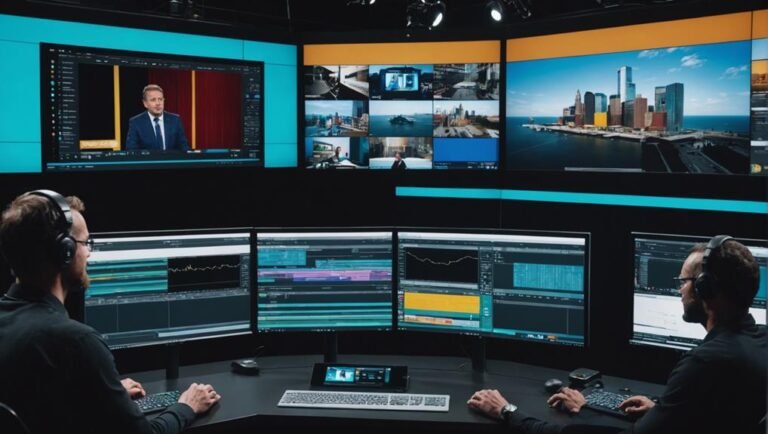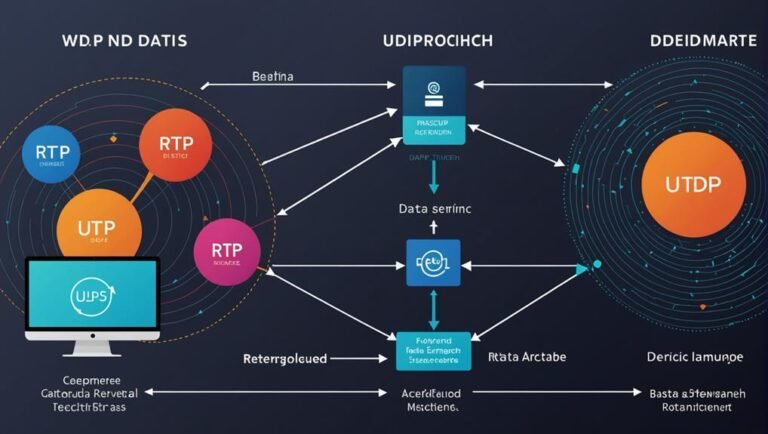When choosing between 720p and 1080p CCTV cameras, consider image quality, storage needs, and cost. 1080p cameras provide sharper images, better color accuracy, and superior low-light performance compared to 720p. They cover more area and capture critical details, ideal for larger spaces. However, 1080p requires more storage and bandwidth, which might increase costs. 720p cameras are more cost-effective, suitable for smaller areas, and use less storage and bandwidth. Your choice depends on whether you prioritize detail or efficiency. Keep going to explore the specifics of each option and decide what best fits your surveillance needs.
Resolution Comparison
When comparing 720P and 1080P CCTV, the primary difference lies in the resolution and detail each provides. The 720P CCTV cameras offer a resolution of 1280×720 pixels, while 1080P cameras step it up to 1920×1080 pixels. This increase in pixel count means you’re getting a clearer, more detailed image with 1080P. If you value the freedom to see fine details, like facial features or license plates, 1080P is the way to go.
Choosing 1080P CCTV allows you to cover more ground without sacrificing image quality. You won’t need as many cameras to monitor a space, which could simplify your setup and reduce costs in the long run. On the other hand, 720P cameras might be sufficient if you’re covering smaller areas or only need to capture general activity.
In terms of storage, higher resolution means larger file sizes. With 1080P, you’ll need more storage capacity or a more efficient compression method. But if you’re looking for freedom from blurry, ambiguous footage, investing in 1080P is worth considering. So, if you want crisp, detailed surveillance that leaves no room for doubt, 1080P is your best bet.
Image Quality
Image quality in CCTV systems greatly affects your ability to accurately monitor and interpret surveillance footage. When you’re choosing between 720p and 1080p, you’ll notice that 1080p cameras capture more detail, giving you sharper and clearer images. This higher resolution can be critical for identifying faces, reading license plates, and spotting intricate details that a 720p camera might miss.
You want the freedom to feel secure, and that’s where 1080p cameras shine. They offer better color accuracy and improved low-light performance, ensuring you get clearer footage, even in challenging lighting conditions. If you’re monitoring a busy area, like a store or a parking lot, this enhanced image quality can make all the difference when it comes to recognizing suspicious activity or providing evidence.
In contrast, 720p cameras, while still useful, might not deliver the same level of detail. You could miss out on critical information that could help you make informed decisions quickly. For anyone who values their security and wants the freedom to act confidently, investing in 1080p cameras offers a significant advantage in clarity and detail. Your peace of mind is worth it.
Viewing Distance
Viewing distance plays an essential role in determining whether a 720p or 1080p CCTV camera will best meet your surveillance needs. If you need to monitor a larger area, a 1080p camera is your friend. With its higher resolution, it captures more detail over greater distances, allowing you to identify faces, license plates, and other critical details from farther away. This is especially useful for outdoor surveillance or large indoor spaces where you want every corner covered without sacrificing image quality.
On the other hand, if your surveillance area is smaller, like a small retail store or an office, a 720p camera might be sufficient. It provides decent image quality, and the lower resolution often means less strain on your network. You won’t need to worry about missing out on important details if the viewing distance is short.
Your choice should depend on the specific needs of your space. Assess the size of the area you want to cover and the level of detail you require. If freedom to monitor every detail is important to you, go for 1080p. But for close-range monitoring, 720p can be both cost-effective and efficient.
Storage Requirements
Considering storage requirements is crucial when choosing between 720p and 1080p CCTV cameras. You want to guarantee you have enough space for all your footage without constantly worrying about running out. Here’s a quick glance at how storage needs differ:
| Resolution | Daily Storage (GB) | Monthly Storage (TB) |
|---|---|---|
| 720p | 7 | 0.21 |
| 1080p | 15 | 0.45 |
With 720p, you’ll use about 7GB per day, translating to roughly 0.21TB per month. On the other hand, 1080p demands around 15GB daily, or 0.45TB monthly. This means a 1080p camera’s footage will almost double your storage needs compared to a 720p camera.
Having twice the resolution gives you clearer images, but it also means larger files. If you’re someone who values freedom and flexibility, think about how much storage you really need. You might want to invest in larger hard drives or cloud storage solutions to keep up with higher resolution footage. Balancing the need for high-quality video with practical storage considerations will help you make the best choice for your surveillance needs.
Bandwidth Usage
When making a decision between 720p and 1080p CCTV cameras, it’s important to evaluate how each resolution will impact your bandwidth usage. Higher resolution cameras, like 1080p, offer sharper images, but they also consume more bandwidth. This can affect your network’s performance, especially if you have multiple cameras running simultaneously.
Here are three key points to keep in mind:
- Bandwidth Consumption: A 1080p camera typically requires around 3-4 Mbps of bandwidth, while a 720p camera uses about 1-2 Mbps. If your network has limited bandwidth, opting for 720p cameras might be a better choice.
- Network Performance: High bandwidth consumption can slow down your network, affecting other connected devices. If you need your network to support various activities, you’ll need to balance camera resolution and bandwidth usage.
- Cost Implications: Higher bandwidth usage may mean higher internet costs, especially if your ISP charges based on data usage. Evaluate your budget and determine whether the extra clarity of 1080p is worth the potential increase in expenses.
Night Vision Performance
Night vision performance is a crucial factor to consider when choosing between 720p and 1080p CCTV cameras, especially if monitoring low-light environments is a priority. You want to guarantee your surveillance system can capture clear images even in the darkest conditions, providing you with peace of mind and the freedom to feel secure.
With 1080p cameras, you generally get better night vision performance. They come with advanced infrared (IR) technology, which enhances visibility in low-light situations. This means you’ll see more details, like facial features or license plates, even when it’s pitch dark. 1080p cameras typically offer more IR LEDs and better IR cut filters, providing superior clarity and contrast at night.
On the other hand, 720p cameras, while still effective, may not deliver the same level of detail in low-light conditions. They often come with fewer IR LEDs and less sophisticated IR technology. If your surveillance area is well-lit, 720p might suffice. But if you demand more detail and better night vision, 1080p is the way to go.
Installation Ease
Installing 720p and 1080p CCTV cameras can be straightforward, but there are key differences that might affect your choice. When it comes to 720p cameras, you’ll find they often require less bandwidth and storage, making them simpler to integrate into existing systems without needing major upgrades. On the other hand, 1080p cameras offer higher resolution, which means you’ll get clearer images, but this comes with additional demands on your network and storage capacity.
Here are three key points to take into account:
- Network Requirements: 1080p cameras typically demand higher bandwidth. If your current network setup is limited, you might need to upgrade your equipment to handle the increased data flow.
- Storage Needs: Higher resolution means larger file sizes. Ensure you have adequate storage solutions in place, or be prepared to expand your current setup.
- Compatibility: Some older systems may not support 1080p cameras without firmware updates or additional hardware. Always check for compatibility with your existing equipment.
Cost Differences
You’ll often find that 720p CCTV cameras are more budget-friendly compared to their 1080p counterparts. When you’re looking to secure your space without breaking the bank, 720p cameras make a compelling case. The cost savings can be substantial, especially if you’re outfitting multiple locations. While 1080p cameras offer higher resolution, the price difference might make you reconsider if that extra clarity is worth the additional expense.
Here’s a quick comparison to help you visualize the cost differences:
| Feature | 720p CCTV Cameras | 1080p CCTV Cameras |
|---|---|---|
| Average Price | $50-$100 | $100-$200 |
| Installation Cost | Lower | Higher |
| Maintenance Expenses | Lower | Higher |
| Storage Requirements | Less (lower resolution) | More (higher resolution) |
| Overall Investment | Affordable | Pricier |
Choosing the right camera often boils down to what you value more: cost savings or enhanced image quality. If you’re prioritizing budget and want to stretch your dollar, 720p cameras are your go-to. They offer reliable security without the hefty price tag. However, if you can afford the investment and desire sharper footage, 1080p cameras might be worth considering. Either way, you have the freedom to decide what works best for your needs and wallet.
Application Scenarios
When deciding between 720p and 1080p CCTV cameras, consider where and how you’ll be using them to determine which resolution best fits your needs. Your choice should depend on the specific environment and the level of detail required for effective monitoring.
- Home Security: For monitoring smaller spaces like apartments or single-family homes, 720p cameras might suffice. They provide a decent image quality that’s enough for identifying faces and general activities.
- Business Surveillance: If you’re securing a larger area such as a retail store or an office, 1080p cameras can offer the higher resolution needed to capture finer details. This can be essential for identifying suspects or monitoring employee activities.
- Outdoor Monitoring: For outdoor environments with varying light conditions, 1080p cameras tend to perform better. The higher resolution helps in identifying license plates and distinguishing features that might be missed with 720p.
Future Proofing
Choosing the right CCTV resolution impacts not just your current security needs but also how well your system adapts to future technological advancements. When you’re deciding between 720P and 1080P, think about the long-term benefits. A 1080P system offers higher resolution, which could mean clearer footage and better facial recognition, both important as technology evolves.
Investing in 1080P today gives you a head start on future-proofing your security setup. It aligns with upcoming trends in AI and machine learning, where higher resolution images will be essential for advanced analytics. You want a system that won’t become obsolete in a couple of years, right? With 1080P, you’re more likely to integrate seamlessly with future tech enhancements.
Moreover, 1080P systems are becoming the standard, meaning better support and more frequent updates. Manufacturers are focusing their innovation on higher resolutions, so opting for 1080P ensures you’re in line with where the industry is heading. Don’t settle for less when you can choose a system that not only meets your needs today but also paves the way for tomorrow. Your security deserves the freedom to evolve, just like you do.
Frequently Asked Questions
How Does Weather Affect P Vs 1080P CCTV Performance?
Weather can mess with both P and 1080P CCTV, but you’ll notice it more with lower resolution. Rain, fog, and snow blur images, reducing clarity. High-res cameras handle these conditions better, giving you clearer footage.
Are There Compatibility Issues With Older CCTV Systems?
You might face compatibility issues with older CCTV systems. Verify that your new equipment supports the existing infrastructure. Don’t let outdated tech limit your freedom; sometimes, upgrading the whole system is the best way to go.
What Are the Power Consumption Differences Between P and 1080P Cctv?
On average, 1080p CCTV cameras use about 20-30% more power than standard P cameras. It’s important to take into account this extra power usage if you’re aiming for a more energy-efficient setup that gives you freedom from high electricity bills.
How Do P and 1080P CCTV Handle Motion Detection?
You’ll notice 1080p CCTV handles motion detection more accurately, capturing finer details. Lower resolution systems might miss some movement or give false alarms. For reliable security, you’ll want the sharper, more precise motion detection of 1080p cameras.
Can P and 1080P CCTV Integrate With Smart Home Systems?
You’ll love the flexibility! Both CCTV types can integrate with smart home systems. You can monitor your home remotely and get instant alerts, giving you the freedom to go anywhere while keeping your home secure.



